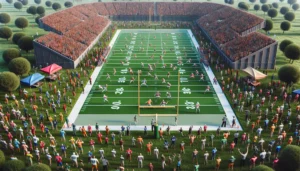Ever wondered about the largest city that’s yet to host an NFL team? You might be surprised to learn it’s not as obvious as you’d think. The NFL, with its 32 teams, covers a lot of ground, but there are still some significant gaps on the map.
This isn’t just a trivia question, it’s a deep dive into the fascinating intersection of sports, geography, and population trends. So, buckle up and get ready to explore the urban landscapes of America that are still waiting for the touchdown call of their own NFL team.
Exploring Cities Without NFL Teams
Let’s dive into some of the largest US cities that have yet to welcome an NFL team. It’s fascinating to note that the size of a city doesn’t always guarantee the presence of a NFL franchise. Sports, geography, and population trends play a crucial role in this regard.
Los Angeles, until recently, was among the most prominent examples of this anomaly. Despite being the second largest city in the country, it was without an NFL team for over two decades. However, in 2016, the Rams filled the void, and soon later, the Chargers also decided to call Los Angeles home.
Another surprising city is San Antonio. With a population over 1.5 million, it’s the seventh-largest city in the United States. Yet, there’s no NFL team to represent them. Granted, the city does have an NBA team, the Spurs, but football fans are still waiting for their own franchise.
Next on the list is Austin. You might think it’s a smaller city when compared to Los Angeles or San Antonio, but you’d be wrong. Austin ranks as the eleventh-largest city in the nation, surpassing the likes of Jacksonville and Indianapolis- both cities that hold NFL teams.
Whether it’s due to geographic constraints, economic considerations, or simply a lack of interest from the NFL ownership, some large cities remain on the sidelines.
Here’s a glance at the cities discussed:
| City | Population | NFL Team | Ranking of City size |
| Los Angeles | Over 13.1M | Rams, Chargers | 2nd |
| San Antonio | Over 1.5M | None | 7th |
| Austin | Over 0.97M | None | 11th |
The journey continues as we explore why these cities, despite their size, don’t have their own NFL team. It’s a complex issue that involves far more than just population statistics, so stay tuned as we delve deeper into the exciting world of American football geography.
👉 To explore the history and evolution of NFL franchises, check out “Timeless Rivals: Oldest NFL Franchise“.
Criteria for Determining the Largest City
When we mention “the largest city”, what exactly does that mean? We’ll break down the key components for you.
Population is Paramount
The primary aspect to consider is population. It’s the most direct method to gauge the size of a city. When evaluating the size of a city in context of an NFL franchise, we’re talking about the overall number of residents. It’s not only about who’s living within the city limits. Suburbs and surrounding areas also come into play. For example, consider Green Bay, Wisconsin. It’s technically a small city by population, yet when we include surrounding areas, its fan base significantly increases.
Don’t Neglect the Markets
Population gives you a headcount, but do they actually care about NFL? This is why market size matters just as much. A city must have a strong demand for NFL games, meaning a substantial number of residents are interested in the sport. Practical evidence of this could be local viewership rates for football, or attendance at college-level games.
Economic Influence Counts
Last, but certainly not least, economic influence is a crucial aspect. It’s not just about having a large population, but also the financial resources to support an NFL team. Hosting an NFL team calls for substantial financial commitment. This involves buying tickets, merchandise, and ultimately supporting the team financially. Economic power of a city therefore becomes a significant factor in analyzing city size.
Understanding these criteria will help identify the largest city without an NFL team. We’ll delve further into these aspects in the next section of our discussion. But let’s remember, sports and geography have a complex relationship, and the existence or absence of an NFL team in a city is far from being a simple numbers game.
Top Contenders for the Title
You’d probably think that the largest city without an NFL team would naturally be the city with the largest population. But that’s not always the case. Other factors like economic resources and market demand for NFL games often take precedence.
Most of the cities vying for the title are economic powerhouses with populations larger than some NFL franchise-bearing cities. They are major cultural and economic centers in their respective regions and have fan bases that could, theoretically, support an NFL team.
Here’s an overview of the top contenders:
- Austin, Texas is the 11th largest city in the U.S. and the largest city in the Lone Star State without an NFL franchise. With its booming technology industry and growing population, it would certainly make an appealing market for the NFL.
- San Antonio, Texas may not have the same spotlight as Austin, but it’s population is close and it holds considerable sway as a tourist attraction.
- In Puerto Rico, San Juan is a unique contender. It’s the largest U.S. city that’s off the mainland, and it’s rich cultural tapestry may introduce a new fan-base to the NFL.
- Las Vegas, Nevada recently lost this title when it gained the Raiders in 2020 but it provides insight into how an NFL team can transform the sporting landscape of a city.
These cities all have sizable populations and strong local economies. Yet, they lack an NFL team. Their economic influence, market size, and demand for sports keep them in consideration for NFL expansion. This overview, however, only scratches the surface of what’s needed for a city to host an NFL franchise. The complex relationships between sports, geography, and the city’s resources play pivotal roles in this discussion.
In the grand scheme of things, identifying the largest city without an NFL team depends on how you’re defining “large”. Population numbers alone just don’t cut it. However, when it comes to potential, these cities mentioned, and many more out there, have the ball in their court with a chance to score the biggest touchdown of them all – their own NFL franchise.
Potential Issues for Bringing NFL Teams to these Cities
Although cities like Austin, San Juan, Las Vegas, and San Antonio are favored markets for an NFL franchise, expanding into these territories isn’t without its challenges. Hosting an NFL team is a big commitment that requires more than having a high population count or a strong economy.
Infrastructure is probably the most significant issue. Football stadiums are massive structures which demand a sizable investment and substantial land. And it’s not just the stadium; there’s also the need for parking facilities, traffic management, and public transit to facilitate the influx of fans on game days.
There’s also Marketing and Demand. It’s essential to understand that not all popular sports in a city will automatically be popular in the NFL. Consider the scenario of San Juan, Puerto Rico. Baseball enjoys a much stronger following there than American football. Forcing NFL games onto a market that is predominately interested in other sports may not guarantee success.
The Economic Impact the NFL franchise brings about should also be considered. While hosting an NFL team can boost local businesses and create jobs, it has also been shown that it can lead to gentrification and increased cost of living in some cases.
Finally, Legal and Regulatory Challenges can prove to be a hurdle. NFL rules dictate franchise relocations and expansions. Getting approval from the league and city officials requires time, money, and political will.
Moreover, these cities already have other established teams from different leagues. Adding an NFL team into this mix could stir up issues about market saturation.
While these formidable challenges exist, it’s worth reiterating that these cities make strong cases for NFL expansion. Even with these potential issues, they could very well be the homes to the next NFL franchise. Only time will determine who gets the privilege of hosting a team and forging their own NFL legacy.
Potential Candidates for Future NFL Franchise Expansions
With various factors such as market size, financial viability, and fan base in mind, let’s take a look at some other potential candidate cities that could possibly accommodate an NFL team in the future.
San Antonio, Texas
Another city from the Lone Star State making its case for an NFL team is San Antonio. As the seventh most populous city in the United States with over 1.5 million residents and a strong dedication to its existing sports franchises, San Antonio could potentially be a viable option for the NFL. The Alamodome has already served as a temporary home to the New Orleans Saints following Hurricane Katrina in 2005, proving that the city can support professional football games.
Portland, Oregon
As the largest city in Oregon with around 660,000 residents, Portland stands out as another possible destination for the NFL. Portland’s existing fan base for its NBA team, the Trail Blazers, demonstrates the city’s love for sports. Hosting an NFL team would solidify its reputation as a major sports market and further diversify entertainment options for local fans.
Oklahoma City, Oklahoma
Oklahoma City, with its population of approximately 650,000, is known for hosting the NBA’s Thunder. Sports enthusiasts have shown unwavering excitement and loyalty towards this basketball franchise, fostering a thriving fan base. Therefore, there is reason to believe that an NFL team could find similar success in this enthusiastic sports town.
Factors Influencing NFL Expansion Decisions
In order for a city to be considered for an NFL franchise expansion, various factors must be taken into account. These factors include:
- Population Size and Market Growth: A large and growing population can provide a solid fan base and economic support for the team.
- Economic Viability: Cities with healthy economies are more likely to attract private investors and effectively finance stadiums and other infrastructure needs.
- Existing Sports Culture: The presence of dedicated sports fans can be vital in ensuring long-term success and local excitement towards a new NFL team.
- Ownership: Capable, influential, and financially secure ownership is essential in the foundation of any successful sports franchise.
- Stadium Facilities: Adequate planning and construction of state-of-the-art facilities will play a significant role in attracting an NFL team and hosting sold-out games.
Conclusion
You’ve journeyed through the complexities of bringing an NFL team to cities like Austin, San Juan, Las Vegas, and San Antonio. You understand the hurdles – from infrastructure and marketing to legal issues and competition. Yet, these cities remain strong contenders for NFL expansion, each with the potential to carve out its own legacy in the world of American football. The decision isn’t easy, with so many factors at play. But one thing’s for sure – the city that eventually earns an NFL team will have overcome significant challenges and truly earned its place on the NFL map.
Frequently Asked Questions
What cities are potential markets for NFL expansion?
The article identifies Austin, San Juan, Las Vegas, and San Antonio as potential markets for NFL expansion.
What are the major obstacles for NFL expansion into these cities?
Major obstacles for NFL expansion include infrastructure, marketing, economic impact, legal hurdles, and competition from existing sports teams in these cities.
What does the city need to host an NFL team?
The city needs to have sufficient infrastructure, strong marketing strategies, favorable economic impact predictions, overcome any legal hurdles, and potentially out-compete existing sports teams to host an NFL team.
Are these cities still considered despite the challenges?
Yes, these cities still present strong cases for NFL expansion despite the significant obstacles.
Who makes the final decision on NFL expansion?
The ultimate decision on NFL expansion rests on various factors and will be made by the NFL organization. The decision will determine which city will have the opportunity to host a team and create its own NFL legacy.



